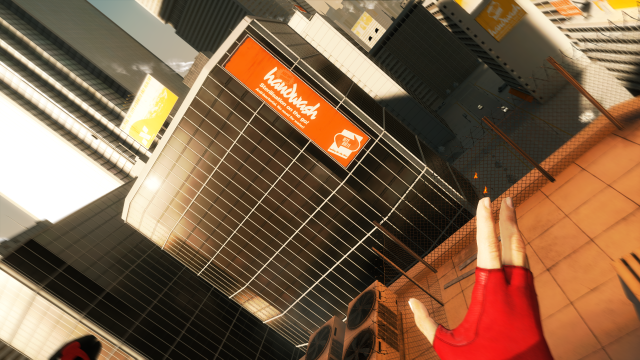This is just a quick thing because I’m not sure what I really have to to say about this.
I’ve been playing Mirror’s Edge in very small chunks recently. I’m generally a marathon player–I will take a Saturday and power through a game because I think games really work best for me when I get the experience in as few sittings as possible. Mirror’s Edge is a little different, though, because I have an intense amount of anxiety while I’m playing it.
Part of the reason for this purely technological. I have a new pair of surround sound headphones that I’ve been wearing while playing the game, and they have made me hypersensitive to sound and vibration while playing. Because of that, for some reason I can’t really fathom, sudden changes in sound are really having a profound effect on me.
Another part, and the operative part that I want to talk about here, is that the way violence is communicated to me in Mirror’s Edge is very, and I hate the word but it is on point here, visceral.
Being shot by a cop and falling to the ground creates a sickening thud.
The wind racing past your ears as you fall to the ground from far too high is followed by a crunch.
I say you here, and me here, because I don’t feel any identification between myself and Faith (the protagonist of the story). She is around in cutscenes, and her voice comes from somewhere behind me. But I am performing the actions. My button presses are mapped to the body that I’m controlling, and when I fail to grab at the right moment, causing me to die, there is no displacing that onto Faith or a back control scheme. That is purely me. In much the same way that Dark Souls is about the development of the player’s ability to play the game more than it is about accruing new abilities, skills, powers, or “leveling up” in any significant way, Mirror’s Edge is about learning the best way to inhabit a particular kind of body.
What can a body do?
So if the game is about efficiently inhabiting a body, controlling that body to the best of your ability, what does it mean when a game purposefully takes away your ability to control that body?[1]
I’ve written previously about how Bulletstorm pulled a similar trick during its climax; the player-as-manipulator is morphed into the player-as-manipulated, functionally making the player an NPC to be whipped around and beaten as a spectacle.
Mirror’s Edge isn’t saving the abuse of the player for the end of the game; it isn’t mere reversal. Instead, the game provides us with moments of very focused failure constantly. Mistiming an altercation with a hostile police officer often ends with the player being pistol-whipped and shot dead. Not moving fast enough, or not dodging behind enough objects, means that you’re picked off from far too far away.
What can a player do with a body?
Denying the player control of the body in Mirror’s Edge, via death (or being surprise attacked by an NPC) is shockingly effective for me. Most of it is how well it counterbalances how the game functions–during the running and puzzle solving, you are free, absolutely free, with a number of ways to contort and fling your body. I experience Mirror’s Edge as a kind of absolute fantasy of bodily liberation; it is an exercise power fantasy. When that is taken from me, even for a moment, it unnerves me.
In a slightly unrelated way, this could be why I didn’t attach myself to Spec Ops: The Line or find it to be saying much of worth. It was about a body that couldn’t do very much–it was able to walk in a line and shoot. When the game finally stood up, winked at the camera, and said “THE FACT THAT YOU COULD ONLY WALK IN A LINE AND SHOOT THE WHOLE TIME WAS THE POINT!” I was powerfully underwhelmed.
Give me nothing and tell me I have nothing and I’ll accept it. Give me liberation for miles and take away an inch of it, just for a second, and you’ve got me fighting to keep it all.
+++++++++++++++++++++++++++++++++++++++++++++++++++++++++++++++
[1] Note: this game is about the control of a woman’s body in a very particular way; the fact that I think the mechanics and design of the game generally is geared toward the elimination of the character as someone in control of herself is operative here.






Have you read Ai’s poetry? Reading it, especially aloud, seems analogous to the effect you describe. Perhaps playing and reading are too dissimilar to be useful for exploring or analyzing the effect, but I share that in case they aren’t.
I haven’t! Can you give me a link?
I tried to find some of the better examples online and they aren’t available. The best of what I can find describes her work rather than let you read it. 😦
FWIW: http://www.nyjournalofbooks.com/review/collected-poems-ai and http://books.google.com/books?id=AwEtBiiphOoC&lpg=PA16&ots=0Flj6eclP_&dq=ai%20ogawa%20poetry&pg=PA15#v=onepage&q=ai%20ogawa%20poetry&f=false (I’m sorry for that crazy google book link but I don’t know how to make the short kind.)